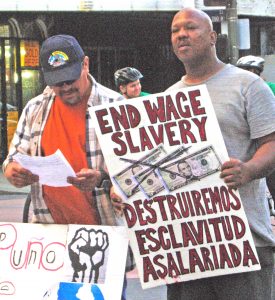
Comrades Discuss Cuba: Not a Communist Country
“My parents are Cuban refugees,” said A’lelia, a new comrade. “I often asked them why they chose to come here. They had such a hard time, culturally. What do you all think of Cuba?”
“In MEChA [a Chicano student organization] we studied what we could get hold of, about the Cuban revolution. We loved Che and admired Fidel. I loved the idea of literacy programs, health clinics for all, the brigades of youth, trying to meet goals,” replied Bella, another comrade.
“When I read Children of the Revolution, I was inspired,” said Claire. “But Fidel declaring that illiteracy would be ended in a year and everyone scrambling to carry it out is a long way from the communist society we’re fighting for.
“This discussion has to be put in the Cold War context of rival imperialists,” she continued. “I don’t think the Fidelistas were fighting for a communist—not even a socialist society—when they overthrew Batista.”
“When the Fidelistas took power, they wanted a few concessions from the US,” said Donna. “When the US refused any concessions, they turned to the Soviets who were glad to step in and become Cuba’s new imperialist master— cutting them a little better deal on the sugar they produced…in exchange for support against US imperialism.
“That’s when Fidel declared he was a communist building socialism,” she added. “They didn’t eliminate wages or money or production for the market. They had to rely on Soviet subsidies until the Soviet Union imploded. Then they started accepting EU investment in hotels and tourism.
“They have trained a lot of doctors and ended illiteracy (I also found their literacy campaign inspiring!) but they didn’t have the outlook of mobilizing the masses to build communism,” she concluded. “They mobilized masses for reforms. But they have inequality and their system depends on markets and imperialism.”
“Yes. I’m very familiar with the history,” replied A’lelia, “as well as anecdotal experiences from both sides. I’m disappointed in the continuing prostitution, black markets and aggression/policing of LGBTQ persons. What do you all think of those issues, specifically? I’m going to Cuba this fall.”
“Most Cubans are poor,” said Donna. “It’s terrible that some feel forced into prostitution! It’s probably related to the exploitation of the tourist industry.”
“I heard it said, in the 1970s, that for all to be equal, would mean we would all be equally poor,” Bella said. “Using the US as a comparative standard. We have to be mindful as to a finite planet.”
“The Castro family lives in a fancy neighborhood,” Donna added. “They and their close group don’t live like the masses. It’s a capitalist class society.”
“I hope you meet up with some open-hearted people, enjoy the weather and scenery,” Bella told A’lelia. I heard that the food is organic and carefully grown! I’d love to see that!”
“It’s true,” answered A’lelia. “I follow Cuba closely. They wiped out prostitution for a millisecond, but after they lost Soviet support, it crept right back in.
“Poor is relative,” she continued. “They have housing subsidies, food subsidies, free healthcare, free lower and higher education, free daycare, but no/low cooking spices (most recent shortage), meat, fingernail polish, Levis, Prada, Gucci, etc. I remember my cousin asking me for money when I was a single parent, working 3 jobs. I explained that I had to choose between paying for daycare or the electric bill, every month.
“Fruits and vegetables are plentiful. Only the major tourist restaurants have meats and spices. The street food vendors do not have tasty food, due to scarcity of olive oil, cumin, oregano, etc. I am bringing a TON of spices!
“Yes! It is classist society. There ARE spices but the government reserves them for the tourists’ restaurants, hotels and resorts. Still, I’d rather have subsidized rent and free healthcare than spices!”
“You can write about Cuba for Red Flag/Bandera Roja,” suggested Ellen. “Especially if you talk with anyone there about communism.”
“I would LOVE to do that,” A’lelia replied.

